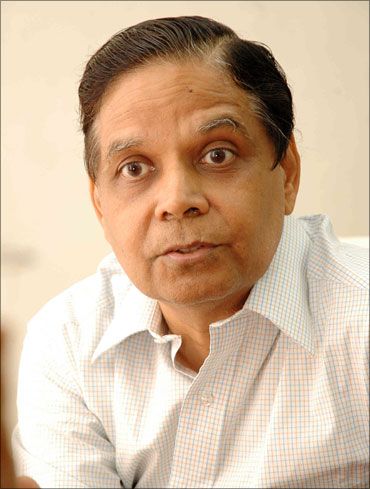To give the decades-old Yojana Bhawan a new look and feel, the corridors of the five-storied building are being painted afresh.
 After more than six months, STD connections are being restored in the rooms occupied by members of the Planning Commission.
After more than six months, STD connections are being restored in the rooms occupied by members of the Planning Commission.
The lines were disconnected after the commission was disbanded in August.
To give the decades-old Yojana Bhawan a new look and feel, the corridors of the five-storied building are being painted afresh.
The nameplate at the Bhawan, just opposite the All India Radio building here, now has the words ‘NITI Aayog’, the body that will replace the over 60-year-old Planning Commission of India, formally disbanded through a government note issued on Friday.
Of particular interest is the office of the new body’s vice-chairman, as this is where the most important person in NITI (an acronym for National Institute for Transforming India) Aayog will sit.
While Prime Minister Narendra Modi will be the chairman of the new entity, eminent economist Arvind Panagariya is tipped to be the vice-chairman.
In one of the first changes related to the new body, the Planning Commission website, planningcommission.nic.in, has been archived with immediate effect.
NITI Aayog could do away with many functions traditionally associated with the Planning Commission.
If the Cabinet note on the new entity is any indication, the body is unlikely to allocate funds or devise five-year Plans, a key function of the Planning Commission, and is more likely to focus on the policy aspect of governance.
The note is silent on the fate of five-year Plans or annual plans.
Or, for that matter, whether the Aayog will have any role in allocation of resources to state governments.
“The final modalities of the distribution of Plan funds to state governments are being worked out.
The regular Plan allocation to states is through the Gadgil-Mukherjee formula and that can be outsourced to any department, including that of expenditure. NITI Aayog need not be part of this.
However, discretionary funding, which was the prerogative of the erstwhile Planning Commission, is the contentious point.
“This can either be merged with the Gadgil-Mukherjee formula or be completely done away with,” said a senior government official.
So, does this mean the end of five-year Plans, something started in the 1950s by Jawaharlal Nehru, India’s first prime minister?
By the look of it, it seems so.
Even if the new body focuses on long-term planning, it is unlikely to do so through five-year Plans.
 “Though nothing can be said with certainty yet, one thing is for sure -- the Cabinet note gives an indication that NITI Aayog is more likely to focus on policy formulation and coordination and less on fund allocation,” former Planning Commission member Saumitra Chaudhuri told Business Standard.
“Though nothing can be said with certainty yet, one thing is for sure -- the Cabinet note gives an indication that NITI Aayog is more likely to focus on policy formulation and coordination and less on fund allocation,” former Planning Commission member Saumitra Chaudhuri told Business Standard.
He added the primary difference between previous commissions and NITI Aayog seemed to be the point that devolution of funds would no longer be a major part of the Aayog’s responsibilities.
Through a circular in October, the finance ministry had directed all major ministries and departments to furnish their Plan Budget estimates for 2015-16 directly to it.
Earlier, these were routed through the Planning Commission. State governments, too, are discussing their annual Plan expenditure estimates with the ministry.
NITI Aayog’s’ objectives, functions and priorities are somewhat similar to the idea with which the Planning Commission was conceived in the 1950s.
“A lot will depend on the first Aayog and the power it derives,” said Pronab Sen, chairman of the National Statistical Commission and one of the longest-serving principal advisors to the Planning Commission.
He added NITI Aayog was expected to examine all policies of the government and one of its members could be someone with experience in the field of national security, as the new entity’s framework implied so.
Arun Maira, another former member of the Planning Commission, says perhaps, the Cabinet note on the new entity is right in not emphasising five-year Plans and junking the function of resource allocation.
“The objectives of NITI Aayog, as spelt out in the note, are best suited to serve the interests of present-day economics and changing global dynamics,” he said, adding the five-year Plan process, though good, hadn’t been sufficiently effective.
“I feel a big challenge will be finding people with adequate expertise and skills to carry out the new Plan process, as spelt out in NITI Aayog’s objectives,” he said.
Images: (Top) The old Yojana Bhavan; (Bottom) Arvind Panagariya
(With inputs from Arup Roychoudhury)










